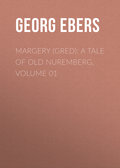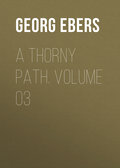
Georg Ebers
The Bride of the Nile. Volume 01
At last, with a bitter sigh, she went to bed; and while she vainly strove for sleep, and for strength to pray and be silently resigned, Time seemed to her a wild-beast chase, Fate a relentless hunter, and the quarry he was pursuing was herself.
CHAPTER IV
On the following evening Haschim, the merchant, came to the governor's house with a small part of his caravan. A stranger might have taken the mansion for the home of a wealthy country-gentleman rather than the official residence of a high official; for at this hour, after sunset, large herds of beasts and sheep were being driven into the vast court- yard behind the house, surrounded on three sides by out-buildings; half a hundred horses of choice breed came, tied in couples, from the watering- place; and in a well-sanded paddock enclosed by hurdles, slaves, brown and black, were bringing fodder to a large troop of camels.
The house itself was well-fitted by its unusually palatial size and antique splendor to be the residence of the emperor's viceroy, and the Mukaukas, to whom it all belonged, had in fact held the office for a long time. After the conquest of the country by the Arabs they had left him in possession, and at the present date he managed the affairs of his Egyptian fellow-countrymen, no more in the name of the emperor at Byzantium, but under the authority of the Khaliff at Medina and his great general, Amru. The Moslem conquerors had found him a ready and judicious mediator; while his fellow-Christians and country-men obeyed him as being the noblest and wealthiest of their race and the descendant of ancestors who had enjoyed high distinction even under the Pharaohs.
Only the governor's residence was Greek—or rather Alexandrian-in style; the court-yards and out-buildings on the contrary, looked as though they belonged to some Oriental magnate-to some Erpaha (or prince of a province) as the Mukaukas' forefathers had been called, a rank which commanded respect both at court and among the populace.
The dragoman had not told the merchant too much beforehand of the governor's possessions: he had vast estates, in both Upper and Lower Egypt, tilled by thousands of slaves under numerous overseers. Here in Memphis was the centre of administration of his property, and besides the offices for his private affairs were those he needed as a state official.
Well-kept quays, and the wide road running along the harbor side, divided his large domain from the river, and a street ran along the wall which enclosed it on the north. On this side was the great gate, always wide open by day, by which servants or persons on business-errands made their entrance; the other gate, a handsome portal with Corinthian columns opening from the Nile-quay, was that by which the waterparty had returned the evening before. This was kept closed, and only opened for the family, or for guests and distinguished visitors. There was a guardhouse at the north gate with a small detachment of Egyptian soldiers, who were entrusted with the protection of the Mukaukas' person.
As soon as the refreshing evening breeze came up from the river after the heat of the day there was a stir in the great court-yard. Men, women and girls came trooping out of the retainers' dwellings to breathe the cooler air. Waiting-maids and slaves dipped for water into enormous earthen vessels and carried it away in graceful jars; the free-men of the household rested in groups after the fatigues of the day, chatting, playing and singing. From the slaves' quarters in another court-yard came confused sounds of singing hymns, with the shrill tones of the double pipe and duller noise of the tabor—an invitation to dance; scolding and laughter; the jubilant shouts of a girl led out to dance, and the shrieks of a victim to the overseer's rod.
The servant's gateway, still hung with flowers and wreaths in honor of Orion's recent return, was wide open for the coming and going of the accountants and scribes, or of such citizens as came very willingly to pay an evening call on their friends in the governor's household; for there were always some officials near the Mukaukas' person who knew more than other folks of the latest events in Church and State.
Ere long a considerable number of men had assembled to sit under the deep wooden porch of the head-steward's dwelling, all taking eager part in the conversation, which they would have found very enjoyable even without the beer which their host offered them in honor of the great event of his young lord's return; for what was ever dearer to Egyptians than a brisk exchange of talk, at the same time heaping ridicule or scorn on their unapproachable superiors in rank, and on all they deem enemies to their creed or their country.
Many a trenchant word and many a witty jest must have been uttered this evening, for hearty laughter and loud applause were incessant in the head steward's porch; the captain of the guard at the gate cast envious and impatient glances at the merry band, which he would gladly have joined; but he could not yet leave his post. The messengers' horses were standing saddled while their riders awaited their orders, there were supplicants and traders to be admitted or turned away, and there were still a number of persons lingering in the large vestibule of the governor's palace and craving to speak with him, for it was well known in Memphis that during the hot season the ailing Mukaukas granted audience only in the evening.
The Egyptians had not yet acquired full confidence in the Arab government, and every one tried to avoid being handed over to its representative; for none of its officials could be so wise or so just as their old Mukaukas. How the suffering man found strength and time to keep an eye on everything, it was hard to imagine; but the fact remained that he himself looked into every decision. At the same time no one could be sure of his affairs being settled out of hand unless he could get at the governor himself.
Business hours were now over; the anxiety caused both by the delay in the rising of the Nile and by the advent of the comet had filled the waiting- rooms with more petitioners than usual. Deputations from town and village magistrates had been admitted in parties; supplicants on private business had gone in one by one; and most of them had come forth content, or at any rate well advised. Only one man still lingered,—a countryman whose case had long been awaiting settlement—in the hope that a gift to the great man's doorkeeper, of a few drachmae out of his poverty might at length secure him the fruit of his long patience—when the chamberlain, bidding him return on the morrow, officiously flung open the high doors that led to the Mukaukas' apartments, to admit the Arab merchant, in consideration of Haschim's gold piece which had come to him through his cousin the dragoman. Haschim, however, had observed the countryman, and insisted on his being shown in first. This was done, and a few minutes later the peasant came out satisfied, and gratefully kissed the Arab's hand.
Then the chamberlain led the old merchant, and the men who followed him with a heavy bale, into a magnificent anteroom to wait; and his patience was put to a severe test before his name was called and he could show the governor his merchandise.
The Mukaukas, in fact, after signifying by a speechless nod that he would presently receive the merchant—who came well recommended—had retired to recreate himself, and was now engaged in a game of draughts, heedless of those whom he kept waiting. He reclined on a divan covered with a sleek lioness' skin, while his young antagonist sat opposite on a low stool, The doors of the room, facing the Nile, where he received petitioners were left half open to admit the fresher but still warm evening-air. The green velarium or awning, which during the day had screened off the sun's rays where the middle of the ceiling was open to the sky, was now rolled back, and the moon and stars looked down into the room. It was well adapted to its purpose as a refuge from the heat of the summer day, for the walls were lined with cool, colored earthenware tiles, the floor was a brightly-tinted mosaic of patterns on a ground of gold glass, and in the circular central ornament of this artistic pavement stood the real source of freshness: a basin, two man's length across, of brown porphyry flecked with white, from which a fountain leaped, filling the surrounding air with misty spray. A few stools, couches and small tables, all of cool-looking metal, formed the sole furniture of this lofty apartment which was brilliantly lighted by numerous lamps.
A light air blew in through the open roof and doors, made the lamps flicker, and played with Paula's brown hair as she sat absorbed, as it seemed, in the game. Orion, who stood behind her, had several times endeavored to attract her attention, but in vain. He now eagerly offered his services to fetch her a handkerchief to preserve her from a chill; this, however, she shortly and decidedly declined, though the breeze came up damp from the river and she had more than once drawn her peplos more closely across her bosom.
The young man set his teeth at this fresh repulse. He did not know that his mother had told Paula what he had yesterday agreed to, and could not account for the girl's altered behavior. All day she had treated him with icy coldness, had scarcely answered his questions with a distant "Yes," or "No;" and to him, the spoilt favorite of women, this conduct had become more and more intolerable. Yes, his mother had judged her rightly: she allowed herself to be swayed in a most extraordinary manner by her moods; and now even he was to feel the insolence of her haughtiness, of which he had as yet seen nothing. This repellent coldness bordered on rudeness and he had no mind to submit to it for long. It was with deep vexation that he watched every turn of her hand, every movement of her body, and the varying expression of her face; and the more the image of this proud maiden sank into his heart the more lovely and perfect he thought her, and the greater grew his desire to see her smile once more, to see her again as sweetly womanly as she had been but yesterday. Now she was like nothing so much as a splendid marble statue, though he knew indeed that it had a soul—and what a glorious task it would be to free this fair being from herself, as it were, from the foolish tempers that enslaved her, to show her—by severity if need should be—what best beseems a woman, a maiden.
He became more and more exclusively absorbed in watching the young girl, as his mother—who was sitting with Dame Susannah on a couch at some little distance from the players—observed with growing annoyance, and she tried to divert his attention by questions and small errands, so as to give his evident excitement a fresh direction.
Who could have thought, yesterday morning, that her darling would so soon cause her fresh vexation and anxiety.
He had come home just such a man as she and his father could have wished: independent and experienced in the ways of the great world. In the Capital he had, no doubt, enjoyed all that seems pleasant in the eyes of a wealthy youth, but in spite of that he had remained fresh and open- hearted even to the smallest things; and this was what most rejoiced his father. In him there was no trace of the satiety, the blunted faculty for enjoyment, which fell like a blight on so many men of his age and rank. He could still play as merrily with little Mary, still take as much pleasure in a rare flower or a fine horse, as before his departure. At the same time he had gained keen insight into the political situation of the time, into the state of the empire and the court, into administration, and the innovations in church matters; it was a joy to his father to hear him discourse; and he assured his wife that he had learnt a great deal from the boy, that Orion was on the high road to be a great statesman and was already quite capable of taking his father's place.
When Neforis confessed how large a sum in debts Orion had left in Constantinople the old man put his hand in his purse with a sort of pride, delighted to find that his sole remaining heir knew how to spend the immense wealth which to him was now a burden rather than a pleasure— to make good use of it, as he himself had done in his day, and display a magnificence of which the lustre was reflected on him and on his name.
"With him, at any rate," said the old man, "one gets something for the money. His horses cost a great deal but he knows how to win with them; his entertainments swallow up a pretty sum, but they gain him respect wherever he goes. He brought me a letter from the Senator Justinus, and the worthy man tells me what a leading part he plays among the gilded youth of the Capital. All this is not to be had for nothing, and it will be cheap in the end. What need we care about a hundred talents more or less! And there is something magnanimous in the lad that has given him the spirit to feel that."
And it was not a hale old grey-beard who spoke thus, but a broken man, whose only joy it was to lavish on his son the riches which he had long been incapable of enjoying. The high-spirited and gifted youth, scarcely more than a boy in years, whom he had sent to the Capital with no small misgivings, must have led a far less lawless life than might have been expected; of this the ruddy tinge in his sunburnt cheeks was ample guarantee, the vigorous solidity of his muscles, and the thick waves of his hair, which was artificially curled and fell in a fringe, as was then the fashion, over his high brow, giving him a certain resemblance to the portraits of Antinous, the handsomest youth in the time of the Emperor Hadrian. Even his mother owned that he looked like health itself, and no member of the Imperial family could be more richly, carefully and fashionably dressed than her darling. But even in the humblest garb he would have been a handsome—a splendid youth, and his mother's pride! When he left home there was still a smack of the provincial about him; but now every kind of awkwardness had vanished, and wherever he might go —even in the Capital, he was certain to be one of the first to attract observation and approval.
And what had he not known in his city experience? The events of half a century had followed each other with intoxicating rapidity in the course of the thirty months he had spent there. The greater the excitement, the greater the pleasure was the watchword of his time; and though he had rioted and revelled on the shores of the Bosphorus if ever man did, still the pleasures of feasting and of love, or of racing with his own victorious horses—all of which he had enjoyed there to the full—were as child's play compared with the nervous tension to which he had been strung by the appalling events he had witnessed on all sides. How petty was the excitement of an Alexandrian horse-race! Whether Timon or Ptolemy or he himself should win—what did it matter? It was a fine thing no doubt to carry off the crown in the circus at Byzantium, but there were other and soul-stirring crises there beyond those which were bound up with horses or chariots. There a throne was the prize, and might cost the blood and life of thousands!—What did a man bring home from the churches in the Nile valley? But if he crossed the threshold of St. Sophia's in Constantinople he often might have his blood curdled, or bring home—what matter?—bleeding wounds, or even be carried home —a corpse.
Three times had he seen the throne change masters. An emperor and an empress had been stripped of the purple and mutilated before his eyes.
Aye, then and there he had had real and intense excitement to thrill him to the marrow and quick. As for the rest! Well, yes, he had had more trivial pleasures too. He had not been received as other Egyptians were: half-educated philosophers—who called themselves Sages and assumed a mystic and pompously solemn demeanor, Astrologers, Rhetoricians, poverty- stricken but witty and venemous satirists, physicians making a display of the learning of their forefathers, fanatical theologians—always ready to avail themselves of other weapons than reason and dogma in their bitter contests over articles of faith, hermits and recluses— as foul in mind as they were dirty in their persons, corn-merchants and usurers with whom it was dangerous to conclude a bargain without witnesses. Orion was none of these. As the handsome, genial, and original-minded son of the rich and noble Governor, Mukaukas George, he was welcomed as a sort of ambassador; whatever the golden youth of the city allowed themselves was permitted to him. His purse was as well lined as theirs, his health and vigor far more enduring; and his horses had beaten theirs in three races, though he drove them himself and did not trust them to paid charioteers. The "rich Egyptian," the "New Antinous," "handsome Orion," as he was called, could never be spared from feast or entertainment. He was a welcome guest at the first houses in the city, and in the palace and the villa of the Senator Justinus, an old friend of his father, he was as much at home as a son of the house.
It was under his roof, and the auspices of his kindhearted wife Martina, that he made acquaintance with the fair Heliodora, the widow of a nephew of the Senator; and the whole city had been set talking of the tender intimacy Orion had formed with the beautiful young woman whose rigid virtue had hitherto been a subject of admiration no less than her fair hair and the big jewels with which she loved to set off her simple but costly dress. And many a fair Byzantine had striven for the young Egyptian's good graces before Heliodora had driven them all out of the field. Still, she had not yet succeeded in enslaving Orion deeply and permanently; and when, last evening, he had assured his mother that she was not mistress of his heart he spoke truly.







